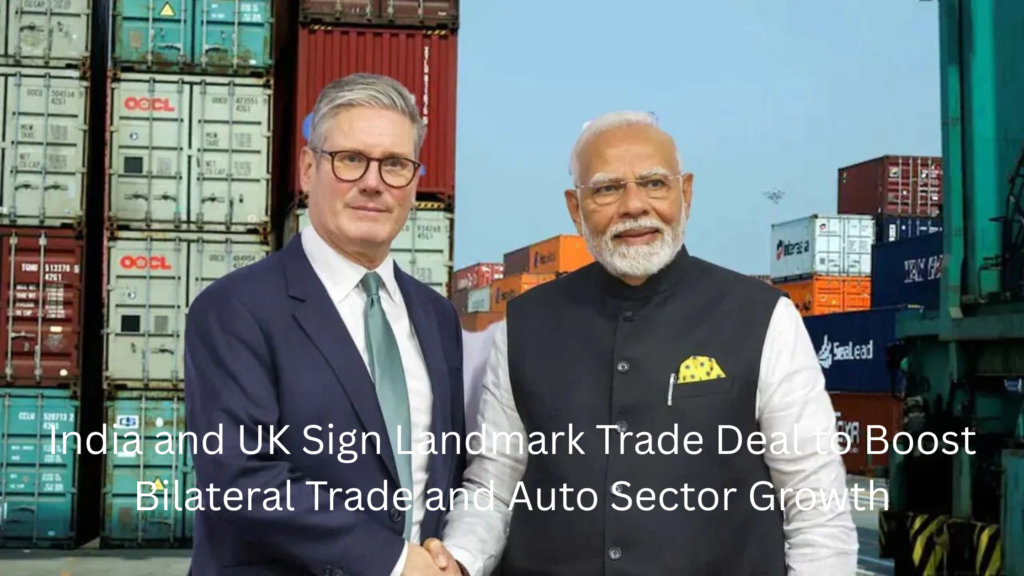India-UK Free Trade Agreement: In a groundbreaking development set to reshape trade dynamics between two major economies, India and the United Kingdom have finalized a historic Free Trade Agreement (FTA). This deal is designed to significantly boost bilateral commerce by eliminating tariffs on 99% of Indian exports and streamlining the entry of British goods such as automobiles, whisky, and various other products into the Indian market.

India-UK Free Trade Agreement: A Major Milestone in Indo-UK Relations
Prime Minister Narendra Modi officially announced the successful conclusion of the Free Trade Agreement, describing it as a key milestone in strengthening the strategic and economic partnership between the two countries. Currently, the trade volume between India and the UK stands at around $60 billion. With this deal, both nations aim to double that figure by 2030.
The FTA marks a transformative shift, offering enhanced opportunities for industries on both sides. For India, this means better access to the British market, while the UK stands to gain a stronger foothold in one of the world’s fastest-growing economies.
Impact on the Auto Sector: Mutual Gains
One of the most noticeable impacts of the deal will be felt in the automobile industry. The FTA significantly reduces import duties on British-made vehicles, a move that is expected to benefit luxury carmakers based in the UK. Until now, British automobile brands faced a steep 100% import tariff when entering the Indian market. Under the new agreement, that figure will drop to just 10% for a select range of vehicles.
This drastic tariff reduction is a game-changer for brands like Jaguar Land Rover (JLR), Aston Martin, Bentley, Rolls-Royce, McLaren, and Norton Motorcycles. These manufacturers are now better positioned to expand their reach among India’s growing population of luxury consumers.
Jaguar Land Rover, which is owned by India’s Tata Motors, stands to gain the most. With manufacturing roots in the UK and a solid presence in India, JLR is well-placed to capitalize on the relaxed trade terms.
ALSO READ, Why I Chose an EV Instead of a Hybrid A Personal Data-Driven Choice
India-UK Free Trade Agreement: Opportunities for Indian Manufacturers
The benefits of the FTA are not one-sided. Indian carmakers are also expected to reap significant rewards as they gain improved access to the UK market. Companies such as Mahindra & Mahindra, Tata Motors, and Maruti Suzuki are among those poised to take advantage.
Mahindra & Mahindra has plans to launch its new lineup of electric SUVs, including the BE.05 and XUV.e9, across Europe. The new trade framework could simplify and accelerate this entry into the UK, helping Mahindra offer these vehicles at more competitive prices.
Tata Motors may also use this opportunity to expand exports of its India-made models, including electric vehicles (EVs), to the British market. Likewise, Maruti Suzuki’s plan to introduce its first EV from its Gujarat plant could receive a boost, particularly as the UK aggressively pushes toward eco-friendly transport options.
Boost for Two-Wheeler Manufacturers and Component Suppliers
Beyond four-wheelers, the FTA provides strong support for India’s two-wheeler industry. Major brands like Royal Enfield, Bajaj Auto, and TVS Motor Company are likely to see improved sales prospects in the UK, owing to reduced import duties.
Royal Enfield, in particular, has already carved a niche in international markets with its classic motorcycles. The trade deal will now make it easier and more affordable to expand further in the UK.
Meanwhile, auto component suppliers such as Motherson Sumi Systems, Sundram Fasteners, and Endurance Technologies are set to benefit as well. These companies already have a robust export profile and can now enjoy smoother market entry and better profit margins due to reduced trade barriers.
Strategic Timing and Broader Economic Vision
This Free Trade Agreement comes at a critical time. Both India and the UK are actively looking to diversify their trade relationships and reduce dependency on conventional markets. By forging closer economic ties through this pact, both nations can leverage their strengths in innovation, technology, and manufacturing.
The agreement is expected to serve as a launching pad for deeper industrial collaboration in areas like electric vehicles, smart mobility solutions, and research and development. Analysts suggest the FTA could open the door to cooperative ventures in next-gen transportation, including connected and autonomous vehicles, EV charging infrastructure, and shared R&D initiatives.
Analysts’ Views: A Win-Win for Both Sides
Industry experts and economists see the India–UK FTA as a strategically sound and economically beneficial step for both countries. For India, it’s an opportunity to further integrate into global value chains and promote its “Make in India” initiative. For the UK, this deal presents a golden chance to strengthen post-Brexit trade ties with a rapidly expanding economy.
According to trade analysts, the automobile sector will be among the most positively affected. The agreement not only creates new revenue channels for Indian manufacturers but also helps British luxury brands reach new customer bases at competitive prices.
The agreement is being described as a “model FTA” for future trade deals India might sign with other major economies. It balances the needs of both countries by fostering growth, encouraging innovation, and creating new jobs across sectors.
India-UK Free Trade Agreement: A New Chapter in Bilateral Trade
In summary, the India–UK Free Trade Agreement is more than just a commercial pact—it’s a strategic alliance that aligns the long-term goals of both nations. From slashing tariffs to boosting exports and easing market access, the deal is set to drive growth, innovation, and prosperity.
For automakers, this means unlocking new markets, driving higher sales, and collaborating on futuristic mobility solutions. For consumers, it translates to greater product choices, better pricing, and access to cutting-edge automotive technology.
As the world watches, India and the UK have taken a bold step toward a more interconnected economic future—one driven by trade, innovation, and shared growth.